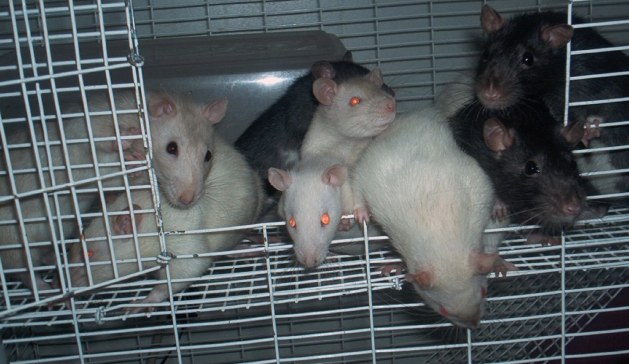Are Rats For You?
Rats are wonderful pets, but no animal is ideal for everyone or every household. You need to consider the answers to these questions (click for what the answers mean when it comes to rat ownership):
 Are you interested in a small pet?
Are you interested in a small pet?
I guess you wouldn't be here if you weren't! Rats are in the same category as mice, hamsters, and gerbils in that they are rodents and they can be kept in cages. Small pets are also different from "house pets" like cats and dogs because they are content to spend the majority of the time in suitable cages, and with extra food and water, they can be left for a day or two if you go on vacation. If a small caged animal gets out, however, he can hide in hard to access places. Small pets are more fragile than larger ones but they also don't require vaccinations or spaying, and their care can be a fairly simple list, that a responsible child can follow.
 Do you want several rats living together?
Do you want several rats living together?
If so, good, Rats not only tolerate each other, they need each other. Unlike most mice, even male rats (as shown here) live together harmoniously. Alone, even with lots of human attention, rats are lonely and do not recover from illness as quickly.
 Or one by itself?
Or one by itself?
Rats are not good candidates for solitary living. They are social creatures. You may find a solitary hamster a more appropriate pet. If it is space you are worried about, one rat and two rats both require the same minimum cage size. Rats also are no less likely to bond with an owner when kept in a pair.
 Do you want an animal that can live outside or in a garage?
Do you want an animal that can live outside or in a garage?
Unlike their wild cousins, rats are not extremely hardy and wide temperature variations can make them very sick. Unless the garage can be heated and cooled, they need to be kept indoors.
 Do you have cats, dogs, ferrets, or large reptiles?
Do you have cats, dogs, ferrets, or large reptiles?
These animals are predators and could easily kill your rats, but rats are not as likely to run into conflict as smaller rodents. If you can supervise any interactions and be able to make sure the other animals can't have access to the rats when you aren't around, this can work out fine. (The cat in this picture is afraid of rats. She is preparing to run away in this picture! Larger male rats often take great pleasure in chasing cats.)
 Do you have mice, gerbils, hamsters, or small birds?
Do you have mice, gerbils, hamsters, or small birds?
Rats will hunt and kill smaller animals. If you have any, make sure the rats cannot access them. (Rats are clever and may be able to open some types of cages.)
 Do you want an animal that needs to be held and interacted with?
Do you want an animal that needs to be held and interacted with?
Rats love interacting with people. They need it, in fact. Rats like to be pet; they will play wrestle with your hand; they will run to their door and beg for attention. No matter how many rats you have, they will all want to be with you.
 Or one you can just watch (and feed and clean, of course)?
Or one you can just watch (and feed and clean, of course)?
Rats aren't "watching pets." You can't just provide food and water and clean their cage and expect them to live complete and happy lives. Mice may be more suited for the life of the desktop pet. Rats require a degree of human interaction.
 Are there children in the household?
Are there children in the household?
As far as children go, rats are one of the best possible small pets. They are tolerant of some rough handling, not as fragile as mice or gerbils, and not nippy like hamsters. For a responsible child, a rat can be their pet easily enough (with adult supervision and intervention if they don't get proper care). Rats are calm animals in general and easily recovered if they escape. Remember, though, that any child needs to be supervised when around an animal.
 Does anyone in the house smoke?
Does anyone in the house smoke?
Rats have very sensitive respiratory systems are vulnerable to several kinds of cancer, so are best suited to a smoke-free environment. If you can make special provisions for your rats in a "no smoking" room, they will probably do okay in the household.
 How much money are you willing to spend on a pet?
How much money are you willing to spend on a pet?
For a pet in general, rats are fairly inexpensive. Compared to other small rodents, they are slightly more expensive. The biggest expense for your rats will be their cage. New commercial cages suitable for 2-6 rats can cost $30 to $100, depending on brands and where you purchase them. Maintenance costs only $5 to $10 a month for food and bedding. Make sure you have extra set aside in case your rat gets sick or develops cancer! Tumor removal can be expensive. To avoid this expense, look for a breeder with healthy lines, and/or adopt males (who are far less at risk for the common mammary tumors).
 Does life span matter?
Does life span matter?
A typical pet store rat may live two or three years at the most. Rats bred for longevity from breeders may live four or five years. Rats are not long-lived animals. This may have advantages if you don't know where you'll be in three years or something, but many people would prefer a longer-lived pet.
 How much odor can you stand?
How much odor can you stand?
Rats are not big producers of smell. Males can have a mild to moderate body odor, but females have none at all. Rat droppings and urine have little to no smell, and weekly cage cleanings are all that is needed to prevent odors. As far as small pets go, rats are not bad. Hamsters and mice (especially male mice) are considerably smellier. Gerbils are the only common small mammal pets with less odor than rats.
 How much time do you have to spend playing with your pet and for feeding or cleaning?
How much time do you have to spend playing with your pet and for feeding or cleaning?
Rats need to be held and played with a half hour to an hour a day. If you don't have much time or go on vacation for a day or two, they won't "go wild," but they still appreciate as much attention as you can give them. Rats need fed every day (or "free feeding" by making sure their bowl is never empty) and water freshened every other day. They need their litter changed at least once a week and a good cage scrubbing every month.
 Do you have allergies?
Do you have allergies?
Rats aren't hypoallergenic, but their allergens are different than cat or dog allergens. If shed fur is a mild problem for you, you can try females which are cleaner and shed less and or hairless rats (picture).
 Do you live in an apartment or dorm room?
Do you live in an apartment or dorm room?
Rats are well-suited for life in smaller places, as long as you have room for a cage. Make sure caged pets are allowed in your lease or dorm rules. If there is a lot of temperature variation, rats may get sick.



